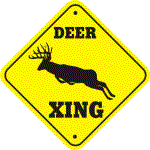A Problem With Deer
 The Insurance Institute for Highway Safety issued a report that drivers frequently hit deer and, being large animals, such accidents are a big problem. Annually vehicle and deer collisions cause thousands of dollars in damages (per vehicle), results in many thousands in injuries and causes hundreds of deaths. The Insurance Institute for Highway Safety issued a report that drivers frequently hit deer and, being large animals, such accidents are a big problem. Annually vehicle and deer collisions cause thousands of dollars in damages (per vehicle), results in many thousands in injuries and causes hundreds of deaths.
So many miles of road go through sites that contain or attract deer, such as fields and forested areas. Naturally, when travelling, deer make no distinction about roadways, crossing the areas as needed. Though deer entering roadways may happen at any time, dawn and dusk are the most likely periods. The result is usually either a "heart-stopping" near-miss or a vehicle and animal-rending crash…often fatal to the deer and serious to the auto and its driver.
There are a number of steps drivers can take to either avoid or minimize the harm associated with deer collisions:
- Watch for wildlife and reduce your speed while driving through areas near fields and forests, particularly at dawn or dusk (often, such areas have traffic signs that warn of deer crossings)
- If a deer is caught in your headlights and if you can do so safely, turn your headlights off and back on
- Try long horn blasts to frighten the animal off the road (this also works for any other animal)
- When braking, apply them firmly and maintain your path of travel. It may seem that swerving makes sense, but the maneuver will either further confuse a deer, or cause a loss of vehicle control and a collision with an off-road object or another vehicle.
- Deer do not travel alone, so expect more whenever you see a deer
- Always be sure to use your seatbelts
- Avoid distractions that take your eyes off the road
The chance for a deer collision is much greater from October through December because of deer mating and hunting seasons. If you do hit a deer, try to get your vehicle off the road and do not approach or touch an injured deer. It is safer to call for emergency assistance.
COPYRIGHT: Insurance Publishing Plus, Inc. 2005
All rights reserved. Production or distribution, whether in whole or in part, in any form of media or language; and no matter what country, state or territory, is expressly forbidden without written consent of Insurance Publishing Plus, Inc.
|